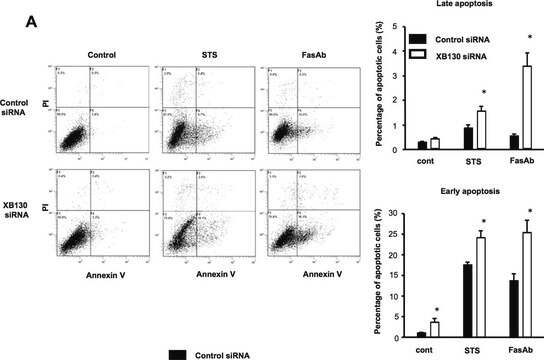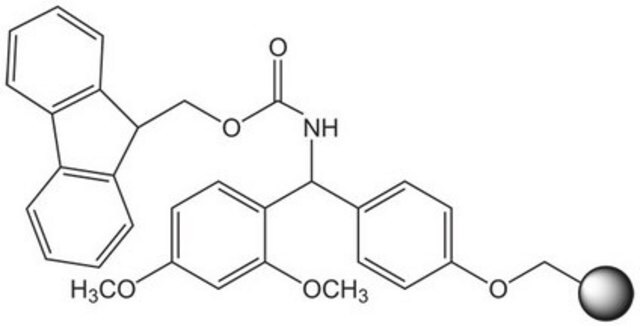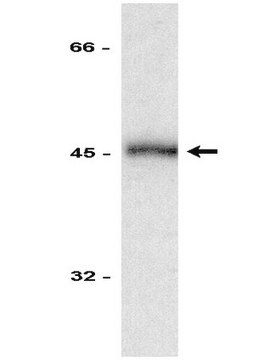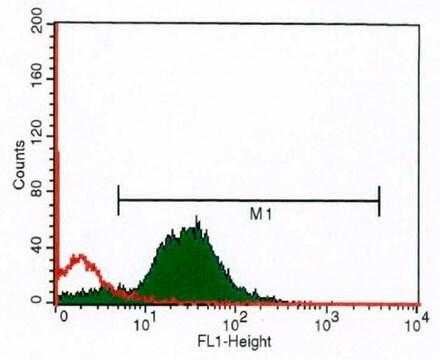推薦產品
product name
Anti-Fas Ligand Antibody, Chemicon®, from rabbit
生物源
rabbit
品質等級
抗體表格
affinity purified immunoglobulin
抗體產品種類
primary antibodies
無性繁殖
polyclonal
純化經由
affinity chromatography
物種活性
human, mouse, rat
製造商/商標名
Chemicon®
技術
ELISA: suitable
western blot: suitable
UniProt登錄號
運輸包裝
dry ice
目標翻譯後修改
unmodified
基因資訊
human ... FAS(355)
特異性
Human FAS Ligand (FASL). The 13-mer human FASL sequence used for antibody production is 92% (12/13 AA) homologous with rat and mouse FASL. Based upon the sequence homology data, anti-human FASL will likely cross react with the mouse/rat FASL.
免疫原
A 13 AA peptide sequence mapping near the C-terminus of human FAS ligand (Mita et al. 1994). This peptide is predicted to be extracellular. The peptide was synthesized with C-terminal Cysteine, coupled to KLH.
應用
Anti-Fas Ligand Antibody detects level of Fas Ligand & has been published & validated for use in ELISA & WB.
Research Category
Apoptosis & Cancer
Apoptosis & Cancer
Research Sub Category
Apoptosis - Additional
Apoptosis - Additional
Western Blotting: 1:1,000-1:5,000 Rat, mouse and human FASL have 278, 279, and 281 AA residues, respectively (calculated MW 32kDa). Western blot of the oocyte has detected a specific 31kDa band (Hakuno et al. 1996). A 40 kDa FASL has been detected in mouse T cells (Hahne 1995). An alternate detecting reagent, mFAS-Fc (Suda & Nagata 1994) also detected a cell surface protein of about 40 kDa.
ELISA: 0.5-1μg/mL
Optimal working dilutions must be determined by the end user.
ELISA: 0.5-1μg/mL
Optimal working dilutions must be determined by the end user.
外觀
Peptide affinity purified immunoglobulin. Liquid in PBS, containing 0.1% BSA.
儲存和穩定性
Maintain frozen at -20°C in undiluted aliquots for up to 12 months. Avoid repeated freeze/thaw cycles.
其他說明
Concentration: Please refer to the Certificate of Analysis for the lot-specific concentration.
法律資訊
CHEMICON is a registered trademark of Merck KGaA, Darmstadt, Germany
免責聲明
Unless otherwise stated in our catalog or other company documentation accompanying the product(s), our products are intended for research use only and are not to be used for any other purpose, which includes but is not limited to, unauthorized commercial uses, in vitro diagnostic uses, ex vivo or in vivo therapeutic uses or any type of consumption or application to humans or animals.
未找到適合的產品?
試用我們的產品選擇工具.
儲存類別代碼
10 - Combustible liquids
水污染物質分類(WGK)
WGK 2
閃點(°F)
Not applicable
閃點(°C)
Not applicable
分析證明 (COA)
輸入產品批次/批號來搜索 分析證明 (COA)。在產品’s標籤上找到批次和批號,寫有 ‘Lot’或‘Batch’.。
Prenatal exposure of mice to diethylstilbestrol disrupts T-cell differentiation by regulating Fas/Fas ligand expression through estrogen receptor element and nuclear factor-?B motifs.
Singh, NP; Singh, UP; Nagarkatti, PS; Nagarkatti, M
Journal of Pharmacology and Experimental Therapeutics null
E Mita et al.
Biochemical and biophysical research communications, 204(2), 468-474 (1994-10-28)
To investigate the role that Fas ligand plays in the apoptosis of hepatocytes induced by hepatitis C virus infection, we isolated a cDNA clone for human Fas ligand and examined the expression of Fas ligand in liver-infiltrating mononuclear cells obtained
M Hahne et al.
International immunology, 7(9), 1381-1386 (1995-09-01)
Mice homozygous for either the gld or lpr mutation develop autoimmune diseases and progressive lymphadenopathy. The lpr mutation is characterized by the absence of functional Fas, whereas gld mice exhibit an inactive FasL due to a point mutation proximal to
T Takahashi et al.
Cell, 76(6), 969-976 (1994-03-25)
Mice homozygous for lpr (lymphoproliferation) or gld (generalized lymphoproliferative disease) develop lymphadenopathy and suffer from autoimmune disease. The lpr mice have a mutation in a cell-surface protein, Fas, that mediates apoptosis. Fas ligand (FasL) is a tumor necrosis factor (TNF)-related
Elena Beltramo et al.
Acta ophthalmologica, 96(1), e19-e26 (2017-01-28)
Loss of pericytes is one the key events in the pathogenesis of diabetic retinopathy. We have previously demonstrated that human retinal pericytes (HRP) are more vulnerable to intermittent than stable high glucose concentrations, with an increase in apoptosis. Our aim
我們的科學家團隊在所有研究領域都有豐富的經驗,包括生命科學、材料科學、化學合成、色譜、分析等.
聯絡技術服務







